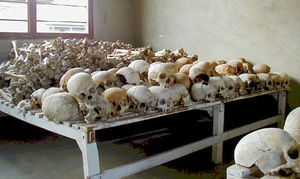This is not a moral invective but a scientific fact: We care more about one murder than a genocide.
It’s a truth both Joseph Stalin and Mother Teresa lived by. He said, “One man’s death is a tragedy. A million deaths is a statistic.” She said, “If I look at the mass, I will never act. If I look at one, I will.”
The mental flaw responsible for the moral one is exposed in this psychology study: “Donations to aid a starving 7-year-old child in Africa declined sharply when her image was accompanied by a statistical summary of the millions of needy children like her in other African countries. The numbers appeared to interfere with people’s feelings of compassion toward the young victim,” writes Paul Slovic.
So the more people dead or in danger, the less we care. It’s the reason we’ve said, “Never again,” over and over again after the Shoah, then Cambodia, Nigeria, Ethiopia, Kosovo, and Rwanda. But still so few Americans recognize the name, Omar al-Bashir, the Sudanese president who has already orchestrated the killing of at least 200,000 people. That’s at least 199,999 too many to grasp—are your eyes glazing over already?
For more on “psychic numbing” or “compassion fatigue,” check out Slovic’s slide presentation. Also watch our photo essay on Darfur.
From a previous Blue Marble post, another explanation of our blindness to injustice is system-justification theory. People want to see the world as fair and just, so they blame the victim to help themselves feel better about the status quo.
















